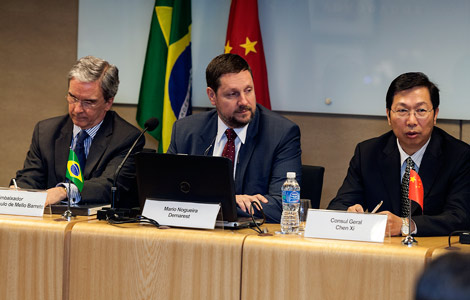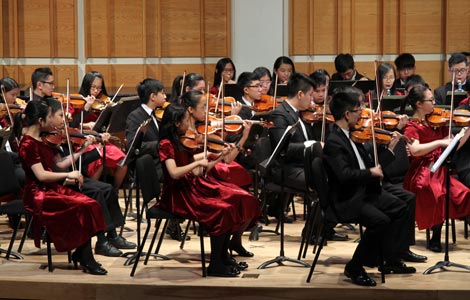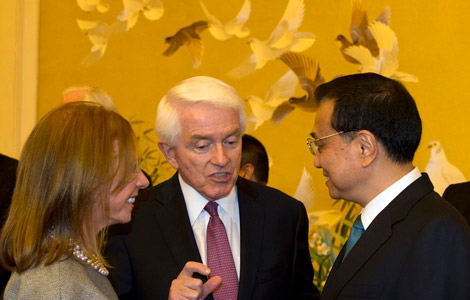How Latin American literature got to China
Updated: 2014-07-19 22:20
By ZHANG YUE (China Daily USA)
|
||||||||
Zheng Shujiu has been teaching Latin American literature in Beijing now for 40 years. A professor in the Spanish department at Beijing Foreign Studies University (BFSU), Zheng was among the 20 or so founders of the Latin American Literature Association in 1979, which for the first time translated works of Latin American literature into Chinese and published them in China.
Two months ago, Zheng and his BFSU colleagues held a seminar on the life and works Gabriel Garcia Marquez, the Colombian novelist who won the 1982 Nobel Prize of Literature with his work One Hundred Years of Solitude.
The seminar was held on May 17 to commemorate the author's passing on April 17, 2014.
"Many well established researchers in Latin American literature came to the seminar that day," he recalled. "The oldest was 95 years old."
The association was founded shortly after Zheng finished his doctoral degree on works of Mexican writer Juan Rulfo in 1990. At that time, literature from Latin American was completely unknown to Chinese readers.
"At thet time, all works of foreign literature were very rare for people in China it was simply too hard to get a copy of any of them," he said. "We had to rely on people who had the chance to travel to other countries on business trips to buy books."
Zheng has been studying Spanish since high school, and that continued as his major in college and later in his teaching career. He was also among the first Chinese to pursue a doctoral degree in Latin American literature in Colombia.
When he returned to China in 1990, he and his colleagues felt that they had accumulated enough Latin American literature and decided to try and spread the knowledge to the rest of society by publishing the books in Chinese.
"The whole process went quite smoothly," Zheng recalled. "At first, we only worked with Yunnan People's Publishing House and People's Literature Publishing House. "
Yunnan, a major government-sponsored provincial publisher, published most of their work.
"The first run of One Hundred Years of Solitude was about 5, 000 copies, but that did not sell well," he said.
Such literary forms were still new to the Chinese at that time.
"And most of the books we published without the writers' permission. They had no idea their works were being translated into Chinese and published," he said.
During his first and only visit to China in 1990, Gabriel Garcia Marquez, after hearing from fans how much of his work had been translated and published without his permission, said bluntly: "All pirates."
"That was a very, very awkward situation," Zheng recalls. "He was right and wrong. China did not join the Berne Convention until 1993, so technically it was legal though still pirated."
Zhao Deming, a professor in the Spanish department of Peking University, was the first to teach Latin American literature to young Chinese writers in the 1990s. Famous young writers such as Mo Yan and Liu Zhenyun were among his students.
Zhao remembers about halfway through the course, Mo Yan came to him and said, "I think some of my early work belongs to the genre of hallucinatory realism."
And that's exactly what the Nobel committee said about Mo's work when awarded him the Nobel Prize in Literature in 2012 , introducing him as a Chinese writer "who with hallucinatory realism merges folk tales, history and the contemporary".
The fully licensed, legitimate version of One Hundred Years of Solitude published by Nanhai Publishing House in 2011 has sold 2.6 million copies as of April 2014.
In June, Zheng attended a book party for a new work falling into the Latin American literature genre El Otoño del Patriarca, (The Autumn of the Patriarch), also by Gabriel Garcia Marquez.
During the ceremony, Zheng asked a question of the audience that led to a short pause in the cheerful gathering.
"We all know that One Hundred Years of Solitude has sold close to 3 million copies so far and I believe that some of you are among the buyers," he said. "But how many of you finished reading the story, or finished half of it?
"Hallucinatory realism is not a very widely enjoyed form of literature for readers in China, though it deeply influenced some of the contemporary writers in China. And that was part of the reason that back in the 1990s, the 5,000 copies of One Hundred Years of Solitude did not sell well," Zheng said.
Contact the writer at zhangyue@chinadaily.com.cn.

 Brazil launches China desk to handle economic ties with China
Brazil launches China desk to handle economic ties with China
 NY Wheel reels in Chinese EB-5 investors
NY Wheel reels in Chinese EB-5 investors
 The Penguins of Madagascar to enter China
The Penguins of Madagascar to enter China
 Panda cub Bao Bao turns one
Panda cub Bao Bao turns one
 HK kid's symphony returns to NY
HK kid's symphony returns to NY
 China, US reach agreement
China, US reach agreement
 40 bodies from jet returned to Dutch soil
40 bodies from jet returned to Dutch soil
 Dance troupe's fusion performance wins over judges
Dance troupe's fusion performance wins over judges
Most Viewed
Editor's Picks

|

|

|

|

|

|
Today's Top News
Manufacturing hits an 18-month high
Transformers producers hit with breach of contract suit
US chipmaker to be deemed monopoly
Chinese still seek Beckel termination
One dead in shooting in Philadelphia
France: Air Algerie plane 'probably' crashed
TransAsia crash while landing in Taiwan
China, UC-Davis set up food safety center
US Weekly

|

|






